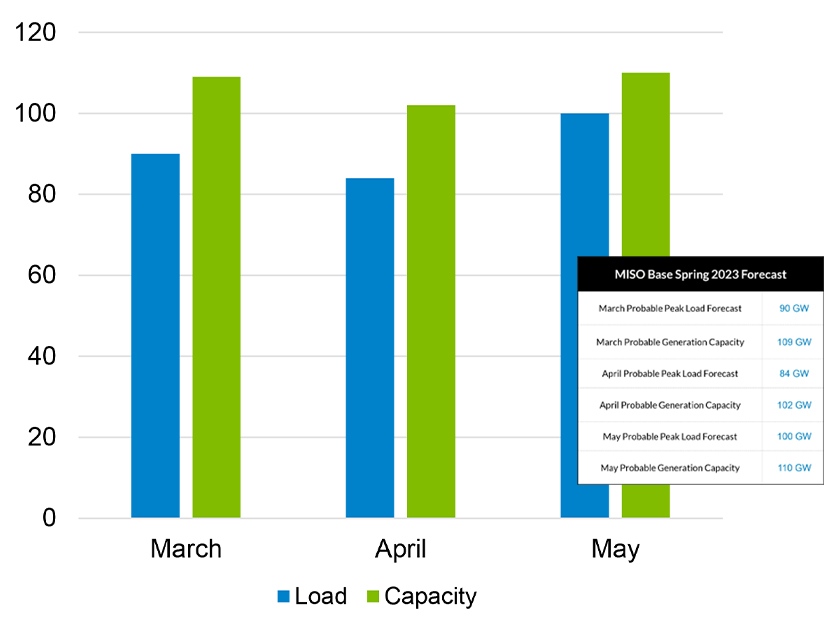FERC on Friday issued MISO a show-cause order saying the grid operator appears to be violating its tariff by failing to publish a systemwide unforced capacity ratio ahead of its first four-season capacity auction in a few weeks.
The commission said although MISO has updated individual units’ ratios of unforced capacity to intermediate seasonal-accredited capacity, it hasn’t updated the systemwide ratio (EL23-46). It ordered MISO within seven days to either show cause as to why it would not have to update the ratio or explain how it will revise the ratio before it conducts its seasonal capacity auctions for the 2023/24 planning year beginning June 1.
Commissioner Mark Christie said FERC’s order on MISO’s missing ratio is more proof that grid operators’ capacity markets are convoluted and dysfunctional.
The ratios are a new concept added alongside MISO’s seasonal, availability-based accreditation style. (See FERC Affirms MISO’s Seasonal Auctions, Accreditation.) MISO and market participants use the ratios to validate capacity values. The RTO said it intended it to be “an annual calculation posted well in advance of each PRA in order to provide market participants certainty as they plan to meet planning reserve margin requirements.”
In an early March filing to FERC to explain issues surrounding the systemwide ratio, MISO said its tariff was silent on the matter of when the ratio should be published in advance of its four-season Planning Resource Auction (PRA) conducted in April. The RTO said it published the annual ratio on Dec. 15, but found that its software registered some previously approved and exempt generator outages over the last three years as illegitimate, thus lowering expected capacity.
While MISO said it issued individual corrections for affected generators, it said it could not update the systemwide ratio again in time for the 2023/24 PRA.
Late last month, Director of Resource Adequacy Coordination Zakaria Joundi said MISO’s filing on the ratio is “an attempt to share and communicate with FERC what we’ve been up to” and signal to FERC that “potential process changes” may be needed moving onto the next planning year.
At the time, Joundi said MISO was in the “final stretch” before running its first seasonal auctions.
FERC said that while it was sympathetic to the challenges MISO faced in pulling off its first seasonal auction, the RTO was nonetheless violating its tariff by not releasing an updated ratio.
“We understand that this is the first year in which MISO is transitioning to its seasonal capacity construct and that errors may occur in executing complex calculations,” FERC said. “In this instance, MISO identified an error in how outage exemptions were calculated and corrected this error by updating the [seasonal accredited capacity] values of affected resources. However, the … tariff does not afford MISO with discretion to decide whether to update the ratio; rather, MISO must calculate the ratio consistent with the formula set forth in the tariff.”
In an email to RTO Insider, MISO said it was reviewing FERC’s order and will submit a formal response by March 24.
Christie Criticizes Capacity Markets
Christie seized on the order as further evidence that grid operators’ capacity markets are plagued by complicated rules.
He said MISO’s seasonal capacity construct is “daunting[ly] complex,” pointing out that the seasonal accreditation values assigned to some thermal resources in the ratio aren’t even “directly” used as their accredited capacity.
“Given these Rube Goldberg machinations, it is perhaps no wonder that something went awry in MISO’s accreditation calculations — though, in fairness, MISO attributes the incorrect calculations to an error by its Control Room Operations Window (CROW) software program in assessing the timeliness of outage submissions (which I suppose represents a serving of CROW),” Christie wrote in a concurrence to the order.
“This proceeding shows once again that these administrative constructs known as capacity markets are characterized by such hopeless complexity and impenetrable opacity that they represent the classic example of a game that only insiders can play and win,” Christie continued. “The interest groups that have the time and resources to navigate this labyrinth can and will make sure their interests are protected or at least advocated well. Whether the public interest is or even can be protected in this insiders’ game is increasingly a salient question.”
Speaking this month at the Gulf Coast Power Association’s MISO-SPP conference, MISO Independent Market Monitor David Patton predicted MISO will gather “lessons learned” from the April auctions and results. He said MISO moved too hastily to design and seek approval for its seasonal market.
“With the speed at which they implemented it, there’s going to be some things that are going to be not quite right,” Patton said.




